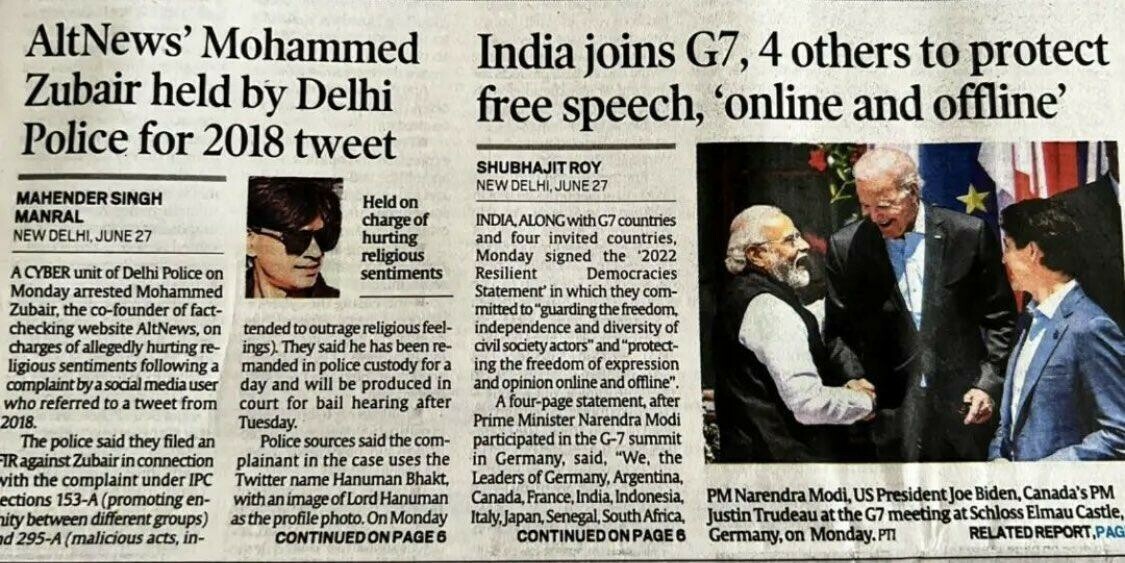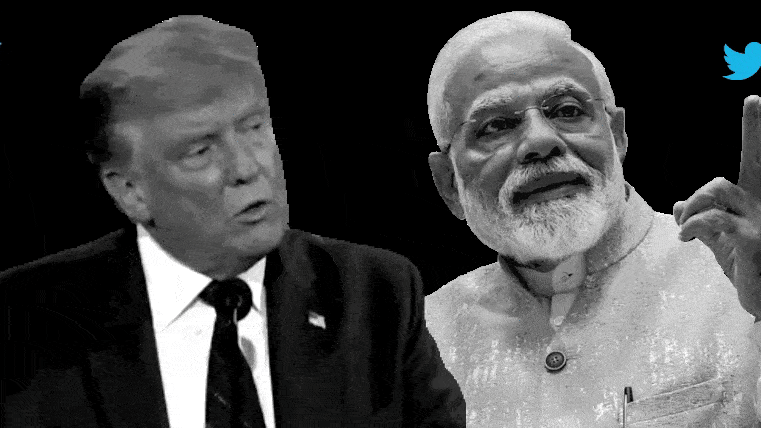July 20, 2022
ISLAMABAD – Pakistani Twitter received a rude awakening last month when India banned the accounts of Pakistan’s UN mission, several foreign missions, and Radio Pakistan, for some unknown legal reason.
The move came months after the Narendra Modi government blocked 16 YouTube channels, including six from Pakistan, for spreading “disinformation related to India’s national security, foreign relations, and public order”.
The message from these actions is clear — Indian Occupied Jammu & Kashmir is OUR Kashmir. Anything else is fake news.
But Pakistan isn’t the victim here, or rather not the only victim. Things are way worse on the digital front within India.
The same day that the Pakistani diplomatic accounts were blocked, fact checker Muhammad Zubair, who was already Enemy No. 1 for calling out the Bharatya Janata Party’s (BJP) falsehoods on Twitter, found himself behind bars for tweets he posted four years ago.
The irony was not lost on observers who noted that the news of the activist’s arrest was reported in papers right next to India’s decision at the G7 to commit to “protect freedom of speech and opinion both online and offline”.

The news story of Muhammad Zubair’s arrest appeared alongside news of India’s decision at the G7 to commit to “protect freedom of speech and opinion both online and offline”. — Image provided by author
Once again, no surprises there.
We are all too familiar with the age-old tactic of using national interest to crack down on dissent. The BJP is just really good at weaponising it. And not just that, it has over the years proven to be excellent at strong arming social media platforms to comply with its demands.
Whether it’s a journalist’s tweet on an attack at a mosque being blocked, opposition leader Rahul Gandhi’s account being suspended, impunity being provided to threats of rape and murder by right-wing fascists, or majoritarian radicalisation targeting the Muslim community, social media platforms have been largely compliant, given the vicious attacks they have been subjected to by the BJP.
Of late, however, Twitter seems to have had enough and is now seeking a judicial review of these takedown actions that the Indian government seems to be constantly demanding.
But is this really a case of the tide shifting? Or is it just another PR stunt to show that social media platforms are the good guys here?
For the sake of democracy
History would argue clearly in favour of the latter. For every Arab Spring, there is a summer, winter and fall of despair, as authoritarian regimes across the world use social media platforms to ensure their dominance and crush any form of dissent. And social media companies aren’t the blameless victims they would have us believe. They are very much part of the problem.
To be fair, much of this is our fault. We believed the hoopla of the late 90s and the early 2000s that the digital economy was a force for democratisation. After all, these platforms just about allowed anyone and everyone a voice to share, an opinion to express, to any audience they would like. If that isn’t freedom of speech and liberty, what is?
And digital companies just took to it like a fish to water. Google became known for its motto ‘Don’t Be Evil’. Facebook took credit for ending a 40-year-old dictatorship in Egypt through digital activism. Twitter is regularly seen as the face of the anti-fascist movement, even going through the trouble of suspending the account of a sitting President of the United States for instigating violence.
These companies were seen as the global manifestation of the liberal project, a mechanism through which oppressed societies across the world could be democratised through free speech and expression.
In their true hubris, liberal governments across the world, particularly those in Western Europe and the United States, dreamed that eventually, social media would make all authoritarian polarised regimes crack from pressure within and shift towards democratic governments as their societies learned to love liberal values. The Arab Spring was seen as the ideal example of this.
Oh 2010. You were so cute and naïve.
Enter the gurus
While the liberals were busy basking in the rays of their own optimism, the real actors who understood the power dynamics of digital society were learning and taking over.
Far right and extremist actors learned far more quickly that the same methods could be used to do the opposite — crack democratic societies from within using the politics of authoritarian polarisation. They recognised how these divisions could be exploited and created a model for mobilising others, intelligently using disinformation and utilising social divides for political gain via digital tools — a method Acker refers to as digital fascism.
In India, the BJP understood this better than anyone, and used it to get Modi into power. And they weren’t alone. The EU Disinfo Lab’s report showed how the Indian government had created a global digital network to spread disinformation about Pakistan and China, among many others, dating back to 2006 when hardly anyone in Pakistan’s higher echelons even knew what Facebook was.
Russia went with the ‘Garasimov doctrine’ — now commonly known as ‘Fifth generation warfare’ — as a key instrument of transnational influencer and regime change by targeting American voters through Facebook to vote in favour of Trump. Digital campaigning was a key element of the 2015 Brexit movement.
It’s all about the money!
Welcome to 2016. The reality check no one was expecting.
The myth of the liberal project has been completely shattered. The fascists have now made their way from the corners of the chat room to the corridors of power, effectively using social divides to grab authority by the neck. And the ripples are still being felt everywhere — from Brexit in the UK, to QAnon and Trump in the US, Modi in India, Bolsonaro in Brazil, Orban in Hungary to Duterte (and now Marcos Jr) in the Philippines.
But social media companies had nothing to do with that! I mean they’re not the ones to blame if their platform is misused by other people? After all, guns don’t kill people. People kill people!
Wrong.
Digital platforms aren’t just part of the problem. They are the problem.
Facebook whistleblower Francis Haugen blew the lid on Facebook’s role in stoking social divisions through machine learning models that maximise engagement that also favour controversy, misinformation, and extremism. To put it simply, people just like outrageous stuff. Facebook knew this for years, but it didn’t care.
Because what digital platforms really care about isn’t freedom or democracy. It’s capitalism.
Somewhere along the line, people have just forgotten that these companies are multi-trillion-dollar corporate Goliaths, to whom profit and the pursuit of it is the only concern. And when push comes to shove, they will always side with their bottom line. Even if that means aligning with fascists.
So is it a surprise that Apple kicked out a popular Quran app from its App store after pressure from Chinese authorities? If you don’t know why, just Google “Xinjiang Muslim Genocide”. Unless you’re reading this in China, in which case those words are actually blocked by the Chinese internet firewall and replaced with state propaganda.
So much for ‘Don’t Be Evil’.
Appeasing the powers that be
Censoring content in the name of “local laws and customs” is a common theme. It explains Amazon’s recent decision to ban LGBTQ content in the UAE, where homosexuality is criminalised. While many would see it as fair, others would see it as being a tool of an oppressive state.
Facebook and YouTube, despite not being allowed in China, have removed content critical of the Chinese Communist Party. I wonder if it has anything to do with gaining access to a market of nearly two billion potential users?
Then there’s the double standards — banning certain kinds of content, while letting others slide.
Twitter has led the global crackdown on hateful content, yet extremist groups and individuals can flex their muscles, spew hatred and issue calls for violence against individuals or groups, with little action against them. Why are tweets and posts inciting such hostility against persecuted religious groups, human rights activists, and journalists in Pakistan not being deemed potentially harmful or suspended?
Which brings us once again, full circle to India.
The BJP has been actively hostile towards anyone criticising its leaders and supporters. Anyone found doing so has invoked the full wrath of the government.
In fact, when independent watchdog Freedom House criticised India for its poor record on internet freedoms, the Indian government demanded that Twitter take down tweets criticising its poor record on internet freedoms.
And so far, Twitter has buckled under the pressure. But is it really pressure, or is it just the cost of doing business? With an economy of 1.2 billion people, and billions in potential revenue, it’s not easy to just say no.
One might be optimistic and believe that Twitter’s decision to appeal the government’s censorship edicts is the first step towards correcting these mistakes and preventing potential atrocities in the future.
Then again, the future owner of Twitter could be an amoral tech multi-billionaire who openly admitted to helping orchestrate a coup in a foreign country so he could make cheaper lithium batteries. And he’s thinking of bringing back Trump. Are we really going to argue principles here?
This is the New World Order, ladies and gentlemen. One where fascism has run rampant across the world, powered by the very tools that were the hope against it.
In this order, might is right, the strong prevail over the weak, and morality is just a nice excuse to censor and oppress people. And let’s be real, the rude awakening Pakistan’s diplomatic missions received won’t be the last time this happens.
And what of the social media platforms? The great misunderstanding is that they let it happen because they were too weak to stop it. They didn’t let it happen. They made it happen.


